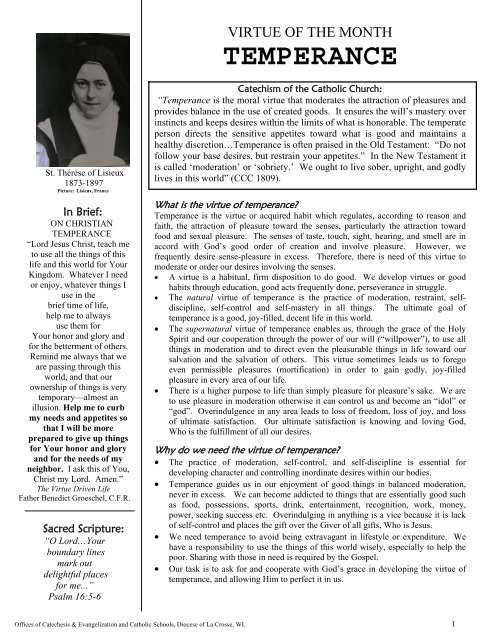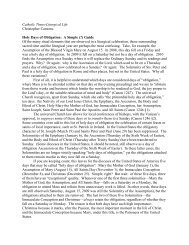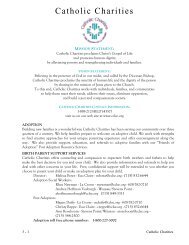TEMPERANCE - Diocese of La Crosse
TEMPERANCE - Diocese of La Crosse
TEMPERANCE - Diocese of La Crosse
Create successful ePaper yourself
Turn your PDF publications into a flip-book with our unique Google optimized e-Paper software.
St. Thérèse <strong>of</strong> Lisieux<br />
1873-1897<br />
Picture: Lisieux, France<br />
In Brief:<br />
ON CHRISTIAN<br />
<strong>TEMPERANCE</strong><br />
“Lord Jesus Christ, teach me<br />
to use all the things <strong>of</strong> this<br />
life and this world for Your<br />
Kingdom. Whatever I need<br />
or enjoy, whatever things I<br />
use in the<br />
brief time <strong>of</strong> life,<br />
help me to always<br />
use them for<br />
Your honor and glory and<br />
for the betterment <strong>of</strong> others.<br />
Remind me always that we<br />
are passing through this<br />
world, and that our<br />
ownership <strong>of</strong> things is very<br />
temporary—almost an<br />
illusion. Help me to curb<br />
my needs and appetites so<br />
that I will be more<br />
prepared to give up things<br />
for Your honor and glory<br />
and for the needs <strong>of</strong> my<br />
neighbor. I ask this <strong>of</strong> You,<br />
Christ my Lord. Amen.”<br />
The Virtue Driven Life<br />
Father Benedict Groeschel, C.F.R.<br />
Sacred Scripture:<br />
“O Lord…Your<br />
boundary lines<br />
mark out<br />
delightful places<br />
for me...”<br />
Psalm 16:5-6<br />
VIRTUE OF THE MONTH<br />
<strong>TEMPERANCE</strong><br />
Catechism <strong>of</strong> the Catholic Church:<br />
“Temperance is the moral virtue that moderates the attraction <strong>of</strong> pleasures and<br />
provides balance in the use <strong>of</strong> created goods. It ensures the will’s mastery over<br />
instincts and keeps desires within the limits <strong>of</strong> what is honorable. The temperate<br />
person directs the sensitive appetites toward what is good and maintains a<br />
healthy discretion…Temperance is <strong>of</strong>ten praised in the Old Testament: “Do not<br />
follow your base desires, but restrain your appetites.” In the New Testament it<br />
is called ‘moderation’ or ‘sobriety.’ We ought to live sober, upright, and godly<br />
lives in this world” (CCC 1809).<br />
What is the virtue <strong>of</strong> temperance?<br />
Temperance is the virtue or acquired habit which regulates, according to reason and<br />
faith, the attraction <strong>of</strong> pleasure toward the senses, particularly the attraction toward<br />
food and sexual pleasure. The senses <strong>of</strong> taste, touch, sight, hearing, and smell are in<br />
accord with God’s good order <strong>of</strong> creation and involve pleasure. However, we<br />
frequently desire sense-pleasure in excess. Therefore, there is need <strong>of</strong> this virtue to<br />
moderate or order our desires involving the senses.<br />
A virtue is a habitual, firm disposition to do good. We develop virtues or good<br />
habits through education, good acts frequently done, perseverance in struggle.<br />
The natural virtue <strong>of</strong> temperance is the practice <strong>of</strong> moderation, restraint, selfdiscipline,<br />
self-control and self-mastery in all things. The ultimate goal <strong>of</strong><br />
temperance is a good, joy-filled, decent life in this world.<br />
The supernatural virtue <strong>of</strong> temperance enables us, through the grace <strong>of</strong> the Holy<br />
Spirit and our cooperation through the power <strong>of</strong> our will (“willpower”), to use all<br />
things in moderation and to direct even the pleasurable things in life toward our<br />
salvation and the salvation <strong>of</strong> others. This virtue sometimes leads us to forego<br />
even permissible pleasures (mortification) in order to gain godly, joy-filled<br />
pleasure in every area <strong>of</strong> our life.<br />
There is a higher purpose to life than simply pleasure for pleasure’s sake. We are<br />
to use pleasure in moderation otherwise it can control us and become an “idol” or<br />
“god”. Overindulgence in any area leads to loss <strong>of</strong> freedom, loss <strong>of</strong> joy, and loss<br />
<strong>of</strong> ultimate satisfaction. Our ultimate satisfaction is knowing and loving God,<br />
Who is the fulfillment <strong>of</strong> all our desires.<br />
Why do we need the virtue <strong>of</strong> temperance?<br />
The practice <strong>of</strong> moderation, self-control, and self-discipline is essential for<br />
developing character and controlling inordinate desires within our bodies.<br />
Temperance guides us in our enjoyment <strong>of</strong> good things in balanced moderation,<br />
never in excess. We can become addicted to things that are essentially good such<br />
as food, possessions, sports, drink, entertainment, recognition, work, money,<br />
power, seeking success etc. Overindulging in anything is a vice because it is lack<br />
<strong>of</strong> self-control and places the gift over the Giver <strong>of</strong> all gifts, Who is Jesus.<br />
We need temperance to avoid being extravagant in lifestyle or expenditure. We<br />
have a responsibility to use the things <strong>of</strong> this world wisely, especially to help the<br />
poor. Sharing with those in need is required by the Gospel.<br />
Our task is to ask for and cooperate with God’s grace in developing the virtue <strong>of</strong><br />
temperance, and allowing Him to perfect it in us.<br />
Offices <strong>of</strong> Catechesis & Evangelization and Catholic Schools, <strong>Diocese</strong> <strong>of</strong> <strong>La</strong> <strong>Crosse</strong>, WI. 1
“In the writings <strong>of</strong> Thérèse<br />
<strong>of</strong> Lisieux we do not find<br />
perhaps, as in other<br />
Doctors, a scholarly<br />
presentation <strong>of</strong> the things<br />
<strong>of</strong> God, but we can discern<br />
an enlightened witness <strong>of</strong><br />
faith which, while accepting<br />
with trusting love God's<br />
merciful condescension and<br />
salvation in Christ, reveals<br />
the mystery and holiness <strong>of</strong><br />
the Church.”<br />
Divini Amoris Scientia<br />
Pope John Paul II<br />
Temperance<br />
Saint Thérèse <strong>of</strong> Lisieux<br />
Fast Facts<br />
Also Known As:<br />
Saint Thérèse <strong>of</strong> the Child Jesus<br />
‘The Little Flower <strong>of</strong> Jesus’<br />
Doctor <strong>of</strong> the Church<br />
Patron <strong>of</strong> AIDS sufferers<br />
Patron <strong>of</strong> tuberculosis<br />
Patron <strong>of</strong> missions<br />
Feast Day:<br />
October 1<br />
Her Life<br />
Thérèse grew up in a loving family as the youngest child in a family <strong>of</strong> nine<br />
children <strong>of</strong> whom only five daughters survived to adulthood.<br />
Because Thérèse was the ‘baby’ <strong>of</strong> the family, frequently she was favored in a<br />
particular way with not only temporal goods but more importantly unconditional<br />
love and hence used to getting everything she desired.<br />
As a child, Thérèse had a temper and threw tantrums when she did not get her way.<br />
She was over-sensitive and cried easily. When she was <strong>of</strong>fered an item from a<br />
basket <strong>of</strong> toys, she took the whole basket. “I choose everything!,” she declared<br />
triumphantly.<br />
When Thérèse was 4 years old her mother died. Her older sister, Pauline who<br />
became a second mother to her, taught Therese until she was 9 years old. At about<br />
that time, Pauline left home and joined the Carmelite convent. Therese determined<br />
in her heart that she too would join the Carmelites someday. She was bitterly<br />
disappointed that Pauline was leaving and that she was not allowed to accompany<br />
her sister.<br />
Accustomed to getting her way, Therese persisted in her attempts to join the<br />
Carmelites. She began her quest by appealing to the administrative priest <strong>of</strong> the<br />
community, the local Bishop, and then the Pope himself. The Bishop finally<br />
allowed her to enter the Carmelites after Easter in 1888 at the age <strong>of</strong> 15.<br />
In the convent, Thérèse was appointed assistant mistress <strong>of</strong> novices. She taught<br />
them her ‘little way’ to attain holiness through confidence and love in God.<br />
Thérèse, the most beloved and well-known saint <strong>of</strong> modern times, wrote her<br />
spiritual memoir “Story <strong>of</strong> a Soul.” She died <strong>of</strong> tuberculosis at the age <strong>of</strong> 24.<br />
How is Saint Therese <strong>of</strong> Lisieux a model <strong>of</strong> Temperance?<br />
Thérèse was the spoiled, favorite child in her family. She was also vain, stubborn,<br />
strong-willed, and given to tantrums. She developed an exaggerated sense <strong>of</strong><br />
sinfulness and suffered from self-doubt. To find her path to Heaven, she followed<br />
her ‘little way’ which was to do little, everyday tasks with great love. She gave up<br />
her selfish ways and as she learned to trust Jesus to make her holy, her wild<br />
emotions and outbursts no longer controlled her.<br />
Thérèse was determined to become a saint. She saw herself as a tiny flower in<br />
God’s garden. She stated, “Perfection consists in doing His will, in being what He<br />
wills us to be.” She relied on small, daily sacrifices instead <strong>of</strong> great deeds to be the<br />
means <strong>of</strong> going to Heaven.<br />
As part <strong>of</strong> her ‘little way,’ she tried to remain like a little child. She did not take<br />
credit for the good she did or the talents she possessed. She referred everything to<br />
God’s goodness and entrusted herself entirely to Him.<br />
Offices <strong>of</strong> Catechesis & Evangelization and Catholic Schools, <strong>Diocese</strong> <strong>of</strong> <strong>La</strong> <strong>Crosse</strong>, WI. 2
Practices to foster the growth <strong>of</strong> the virtue <strong>of</strong> temperance<br />
Prayer to Saint Thérèse <strong>of</strong> Lisieux:<br />
St. Thérèse, the Little Flower, please pick me a rose from your Heavenly Garden and send it to me with<br />
a message <strong>of</strong> love. Ask God to grant the request I Thee implore and tell Him I will love Him, each day,<br />
more and more. Amen.<br />
Make a list <strong>of</strong> the words that describe temperance from page one. Name situations in which you<br />
practiced temperance. Discuss the fact that the practice <strong>of</strong> temperance usually involves asking God for<br />
His help, cooperating with His grace through self-control and then avoiding situations that can tempt us<br />
to be overindulgent.<br />
Growing in restraint and self-control to even begin making sacrifices and <strong>of</strong>fering penances for the love<br />
<strong>of</strong> God (mortification) are necessary for spiritual wellbeing and even small children can do these. These<br />
sacrifices strengthen one’s character so that when sufferings, setbacks, and contradictions occur, one has<br />
the spiritual courage to endure that suffering. During Advent and Lent, decide to give up something<br />
that you like and perhaps to which you are overly attached. Offer these sacrifices to God for the good <strong>of</strong><br />
family members or others who face difficulties and trials. We practice mortification in imitation <strong>of</strong><br />
Christ Who fasted in the desert for 40 days.<br />
Name characteristics <strong>of</strong> people who practice the virtue <strong>of</strong> temperance?<br />
1. Temperate people can delay gratification; they can casually take or leave enjoyable goods.<br />
2. Temperate people are joyful.<br />
3. Temperate people recognize their dignity comes from being a child <strong>of</strong> God, not from possessions,<br />
what they know and can do what they look like, etc.<br />
4. Temperate people put people ahead <strong>of</strong> things.<br />
5. Temperate people appreciate, enjoy and use God’s gifts well but they never elevate the gift above<br />
the Giver <strong>of</strong> all gifts, Who is Jesus.<br />
Moderation distinguishes between what is reasonable and what is self-indulgent and makes reasonable<br />
use <strong>of</strong> our senses, our time etc. in accordance with true and upright principles. Discuss good principles<br />
that are necessary to develop the virtue <strong>of</strong> temperance and how to practice the virtue in specific<br />
circumstances.<br />
To live a truly Christian life we have to be able to say “no” to ourselves. What are some <strong>of</strong> the things<br />
for which we need to practice moderation? What are messages in the media that contradict living by the<br />
virtue <strong>of</strong> temperance? What are the underlying reasons for these messages?<br />
Name problems that arise when we live with lack <strong>of</strong> moderation, such as too much time watching TV,<br />
playing video games, texting or eating snacks.<br />
Read about a biblical saint that lived the virtue <strong>of</strong> temperance.<br />
Example: St. John the Baptist, see Matthew 3:4.<br />
As a class, read about a saint and together discuss how this person models the virtue <strong>of</strong> temperance.<br />
Examples: St. Augustine, St. Francis de Sales, St. Jane Francis de Chantal<br />
During prayer time, examine your conscience each night and ask God if there is an area in your life for<br />
which you need His help to practice the virtue or temperance.<br />
We are to be good stewards <strong>of</strong> all that we have been given, using everything for the dignity <strong>of</strong> the<br />
human person and the Kingdom <strong>of</strong> God. What does it mean to be a good steward?<br />
Offices <strong>of</strong> Catechesis & Evangelization and Catholic Schools, <strong>Diocese</strong> <strong>of</strong> <strong>La</strong> <strong>Crosse</strong>, WI. 3
Read one <strong>of</strong> the Scripture passages and pick a word or phrase that stood out for you:<br />
Matthew 5:1-12 The Beatitudes: Those who are “poor in spirit” recognize that all we have is a gift<br />
from God. We are stewards <strong>of</strong> our possessions and are to practice temperance.<br />
Matthew 9: 10-17 Jesus shows temperance by taking what is there to feed the people and leftovers are<br />
gathered.<br />
I Corinthians 10:13 God will always assist us in temptation if we ask for His help.<br />
In our desire to develop virtue, following the guidance <strong>of</strong> the Holy Spirit is critical. Based upon this<br />
fact, discuss the quote below. “How many times do we lose our peace because we find that our<br />
sanctification is not progressing rapidly enough, that we still have too many faults? But this does<br />
nothing but delay things! St. Francis de Sales goes so far as to say that ‘Nothing retards progress in a<br />
virtue so much as wanting to acquire it with too much haste!’” (Taken from Searching for and<br />
Maintaining Peace, A Small Treatise on Peace <strong>of</strong> Heart, Father Jacques Philippe, www.stpauls.us,<br />
(800)343-2522, pp. 53 - 54)<br />
Memorize Scripture passages that focus on temperance:<br />
Sirach 31:22 “In everything you do be moderate”<br />
2 Peter 1:5-6 “This is reason enough for you to make every effort to undergird your virtue<br />
with faith, your discernment with virtue, and self control with discernment;<br />
this self-control, in turn, should lead to perseverance, and perseverance to<br />
piety, and piety to care for your brother, and care for your brother, to love.”<br />
1Timothy 3:15 “So that if I should be delayed you will know what kind <strong>of</strong> conduct befits a<br />
member <strong>of</strong> God’s household, the Church <strong>of</strong> the living God, the pillar and<br />
bulwark <strong>of</strong> the truth.”<br />
Ephesians 5:15 “Keep careful watch over your conduct. Do not act like fools, but like<br />
thoughtful men.”<br />
Titus 2:1-8 “As for yourself, let your speech be consistent with sound doctrine. Tell the<br />
older men that they must be temperate, serious-minded, and self-controlled;<br />
likewise sound in the faith, loving and steadfast. Similarly, the older women<br />
must behave in ways that befit those who belong to God. They must not be<br />
slanderous gossips or slaves to drink. By their good example they must teach<br />
the younger women to love their husbands and children, to be sensible, chaste,<br />
busy at home, kindly, submissive to their husbands. Thus the word <strong>of</strong> God<br />
will not fall into disrepute. Tell the young men to keep themselves completely<br />
under control – nor may you yourself fail to set them good example. Your<br />
teaching must have the integrity <strong>of</strong> serious, sound words to which no one can<br />
take exception.”<br />
Jesus lived perfect Temperance.<br />
“Because our needs are limited, but our wants are unlimited, a virtue is necessary to<br />
restrain our inordinate appetites and desires—and that virtue is called temperance. It has for its<br />
objective the regulation <strong>of</strong> the sensible appetites by reason.<br />
If we want to save our soul for eternity, we must discipline our body in time. And<br />
we do this not with sadness but with gladness, after the example <strong>of</strong> Jesus ‘Who having joy set<br />
before Him endured the Cross.’”<br />
For those who wish to cultivate the virtue <strong>of</strong> temperance…each day practice at least<br />
three trivial mortifications, for example, holding back the sarcastic word or returning a kindly<br />
answer to a sneer. Second, the magnitude <strong>of</strong> the mortification is not as important as the love <strong>of</strong><br />
God for which it is done…It is the motive that matters – do them out <strong>of</strong> love <strong>of</strong> God.<br />
The Seven Virtues, Archbishop Fulton J. Sheen, Garden City Books, pp. 64, 65, 69.<br />
Offices <strong>of</strong> Catechesis & Evangelization and Catholic Schools, <strong>Diocese</strong> <strong>of</strong> <strong>La</strong> <strong>Crosse</strong>, WI. 4
Additional Resources on the virtue <strong>of</strong> temperance<br />
Pre-school through Third Grade<br />
Book <strong>of</strong> Saints, “Super Heroes <strong>of</strong> God”, Part 2, Father <strong>La</strong>wrence Lovasik, S.V.D., Catholic Book<br />
Publishing Corp. (2 pages with picture)<br />
A Story <strong>of</strong> Saint Thérèse, Brother Ernest, C.S.C., Mary’s Books, www.Marys-Books.com, Amherst, WI.<br />
Saints Tell Their Stories, Mitchell, Patricia and Lo Cascio, Maria Cristina; The Word Among Us Press,<br />
www.wordamongus.org.<br />
Book <strong>of</strong> Saints for Catholic Children, 96 Illustrated Stories, Lord, Fr. Daniel, William J. Hirten Co.<br />
Little Book <strong>of</strong> Saints, Volume 2, Kathleen M. Muldoon, Pauline Books and Media (2 pages with picture)<br />
Picture Book <strong>of</strong> Saints, Saint Joseph Edition, Illustrated Lives <strong>of</strong> the Saints for Young and Old, Father<br />
<strong>La</strong>wrence Lovasik, S.V.D., Catholic Book Publishing Corp.<br />
First Book <strong>of</strong> Saints, Their Life-Story and Example, Father <strong>La</strong>wrence Lovasik, S.V.D.<br />
Teach Me About Saints, discussions and activities for young children, Paul S. And Joan E. Plum, Catherine<br />
M. Odell, Our Sunday Visitor, (800) 348-2440.<br />
Saints for Children: St. Therese in Jesus’ Garden, Anne E. Neuberger, Our Sunday Visitor.<br />
Glory Stories, Volume II, God’s Little Flower, The Story <strong>of</strong> Saint Thérèse <strong>of</strong> Lisieux, with workbook,<br />
Catholic World Mission, www.catholicworldmission.org or (203) 287-6314.<br />
St. Therese <strong>of</strong> Lisieux, DVD, My Catholic Family, The life <strong>of</strong> St. Therese and her little way are explored,<br />
(30 min.) Available from the Office <strong>of</strong> Catechesis and Evangelization<br />
Fourth Grade through Eighth Grade<br />
Saints for Young Readers for Every Day, Volume 2, Wallace, Susan Helen, F.S.P., Pauline Books and Media<br />
The Little Flower, The Story <strong>of</strong> Saint Therese <strong>of</strong> the Child Jesus, Mary Fabyan Windeatt, Tan Books and<br />
Publishers, Inc.(800) 437-5876, (165 pages – quick, easy reading with pictures).<br />
Saint Thérèse and the Roses, Helen Walker Homan, Ignatius Press<br />
Saints <strong>of</strong> the Church, A Teacher’s Guide to the Vision Books, Michael G. Allen, Ignatius Press. Includes<br />
<strong>La</strong>nguage in Context, Time Line, Topics for Written Reports, Discussion Questions and more.<br />
Thérèse, Living on Love, The Life and Impact <strong>of</strong> Thérèse <strong>of</strong> Lisieux, A Television Documentary (55 min.)<br />
Thérèse, the true story <strong>of</strong> Saint Thérèse <strong>of</strong> Lisieux, Ordinary Girl, Extraordinary Soul. A Leonardo<br />
Defilippis Film. (DVD, 96 min.) Available from the Office <strong>of</strong> Catechesis and Evangelization<br />
Ninth Grade through Twelfth Grade<br />
The Story <strong>of</strong> A Soul, Autobiography <strong>of</strong> St. Therese <strong>of</strong> Lisieux, edited by Mother Agnes <strong>of</strong> Jesus, (Teaches her<br />
‘little way’, 216 pages – a smaller sized book)<br />
Modern Saints, Their Lives and Faces, Saint Therese <strong>of</strong> the Child Jesus, (15 pages with many pictures)<br />
The Little Flower, The Story <strong>of</strong> Saint Therese <strong>of</strong> the Child Jesus, Mary Fabyan Windeatt, Tan Books and<br />
Publishers, Inc.(800) 437-5876, (165 pages – quick, easy reading with pictures).<br />
Thérèse, Living on Love, The Life and Impact <strong>of</strong> Thérèse <strong>of</strong> Lisieux, A Television Documentary (55 min.)<br />
Thérèse, the true story <strong>of</strong> Saint Thérèse <strong>of</strong> Lisieux, Ordinary Girl, Extraordinary Soul. A Leonardo<br />
Defilippis Film. (DVD, 96 min.) Available from the Office <strong>of</strong> Catechesis and Evangelization<br />
Thérèse <strong>of</strong> Lisieux, My Vocation is Love, Pauline Video, DVD (21 min.)<br />
Available from the Office <strong>of</strong> Catechesis and Evangelization<br />
Resources for Teachers and Parents<br />
The Virtue Driven Life, Groeschel, Father Benedict J, C.F.R.<br />
Raise Happy Children Teach Them Virtue, Budnick, Mary Ann, R.B. Media, Inc.<br />
The Many Faces <strong>of</strong> Virtue, DeMarco, Donald, Emmaus Road Publishing.<br />
The Heart <strong>of</strong> Virtue, DeMarco, Donald, Ignatius Press.<br />
Offices <strong>of</strong> Catechesis & Evangelization and Catholic Schools, <strong>Diocese</strong> <strong>of</strong> <strong>La</strong> <strong>Crosse</strong>, WI. 5






